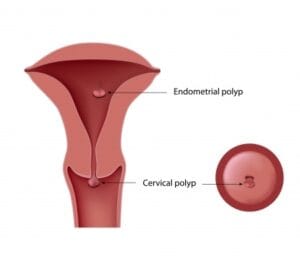Uterine Polyps
Removing uterine polyps clears the way for a healthy pregnancy
Among the structural causes of female infertility, uterine polyps appear in a small percentage of cases at our Manhattan Beach fertility clinic. Typically, polyps form in perimenopausal or menopausal women. If the growths occur during the reproductive years, they can interfere with the ability to conceive or carry a pregnancy.
If you experience heavy menstrual bleeding, irregular cycles, bleeding between cycles or infertility, Joshua J. Berger MD, PhD will order fertility testing for polyps.
What causes uterine polyps?
 Polyps are an overgrowth of the uterine lining that can interfere with an embryo’s ability to implant and develop into a viable pregnancy.
Polyps are an overgrowth of the uterine lining that can interfere with an embryo’s ability to implant and develop into a viable pregnancy.
A polyp will have a thin stalk or broad base. These growths can range in size from a millimeter to several centimeters.
What causes these growths?
The cause of uterine polyps is unclear. The overgrowth of uterine tissue is likely caused by estrogen, the reproductive hormone that primes the uterine lining for pregnancy. Generally, certain risk factors increase a woman’s chance of developing polyps.
- High blood pressure
- Use of tamoxifen, a breast cancer drug
- Obesity or a high body mass index (BMI)
How does Dr. Berger diagnose this issue?
To confirm the presence of uterine polyps, your doctor will perform a special type of ultrasound or in-office hysteroscopy. These tests will reveal any growths that have formed in the uterine lining and grown into the uterine cavity. In some cases, the polyp may have descended into the cervix and may be felt during a pelvic exam.
What are the treatment options?
The size and location of the polyps will help dictate treatment. Smaller polyps may resolve on their own. However, when polyps interfere with the ability to conceive, our Manhattan Beach fertility clinic doctor will likely suggest surgical removal. The options for surgery include hysteroscopic polypectomy as well as dilation and curettage in more severe cases.
As an advanced reproductive surgeon, Dr. Berger has the training and expertise to treat female infertility problems, including polyps. As a result, he is a sought-after surgeon for his ability to carefully address uterine issues while preserving a patient’s ability to conceive and carry a baby. Contact our Manhattan Beach fertility clinic to begin your journey to parenthood.
- Causes of Infertility
- Causes of Female Infertility
- Female Infertility Risk Factors
- Stress and Infertility
- Age and Infertility
- Blocked Tubes
- Endometriosis
- Fibroids and Infertility
- Polycystic Ovarian Syndrome
- Recurrent Pregnancy Loss
- Secondary Infertility
- Unexplained Infertility Treatments
- Uterine Polyps
- Weight and Infertility
- Causes of Male Infertility
- Male Infertility Risk Factors
- Abnormal Semen Analysis
- Azoospermia
- Low T Treatment and Infertility
- Low Sperm Count
- Fertility after Vasectomy
- Varicoceles
- Causes of Infertility
- Causes of Female Infertility
- Female Infertility Risk Factors
- Stress and Infertility
- Age and Infertility
- Blocked Tubes
- Endometriosis
- Fibroids and Infertility
- Polycystic Ovarian Syndrome
- Recurrent Pregnancy Loss
- Secondary Infertility
- Unexplained Infertility Treatments
- Uterine Polyps
- Weight and Infertility
- Causes of Male Infertility
- Male Infertility Risk Factors
- Abnormal Semen Analysis
- Azoospermia
- Low T Treatment and Infertility
- Low Sperm Count
- Fertility after Vasectomy
- Varicoceles
